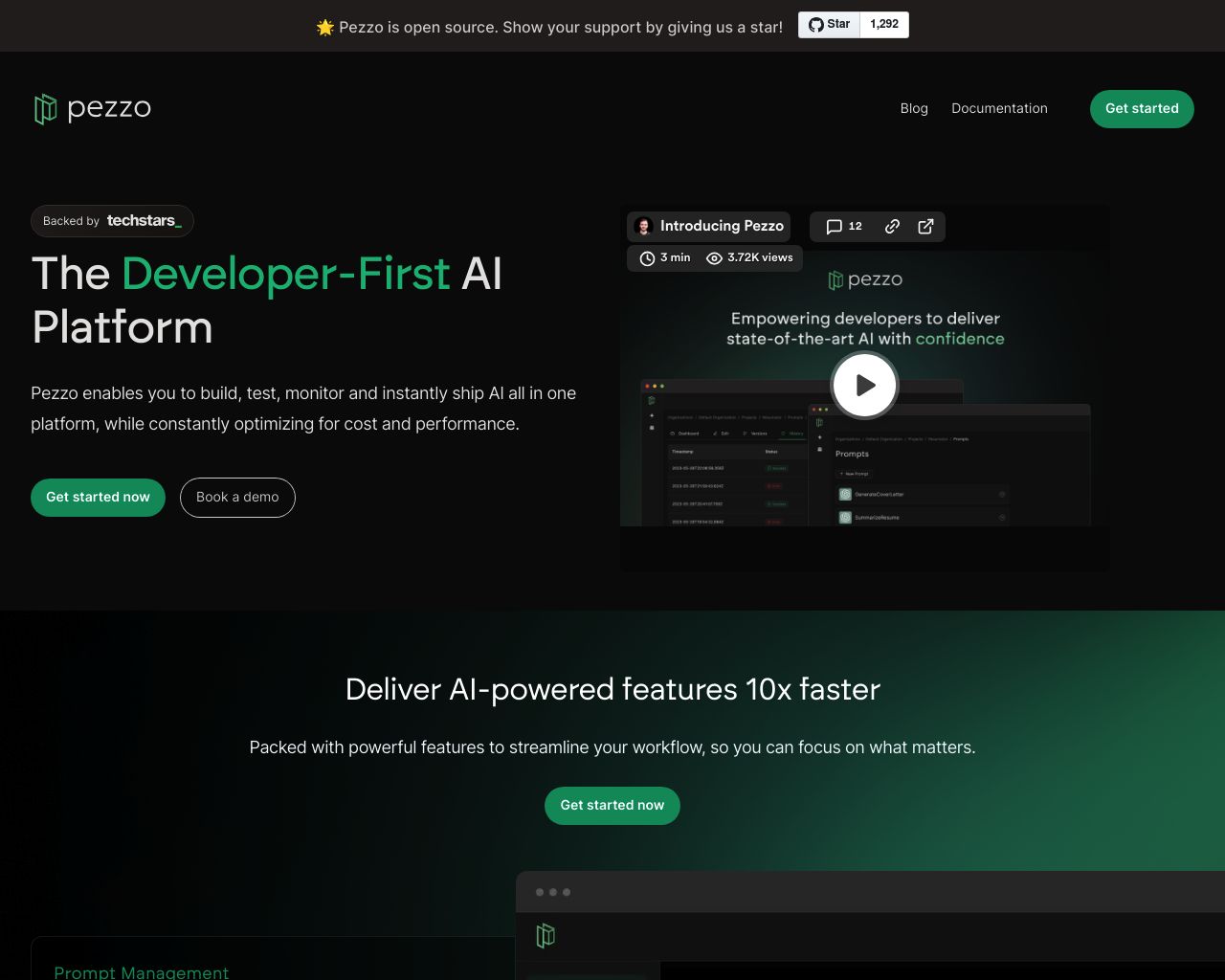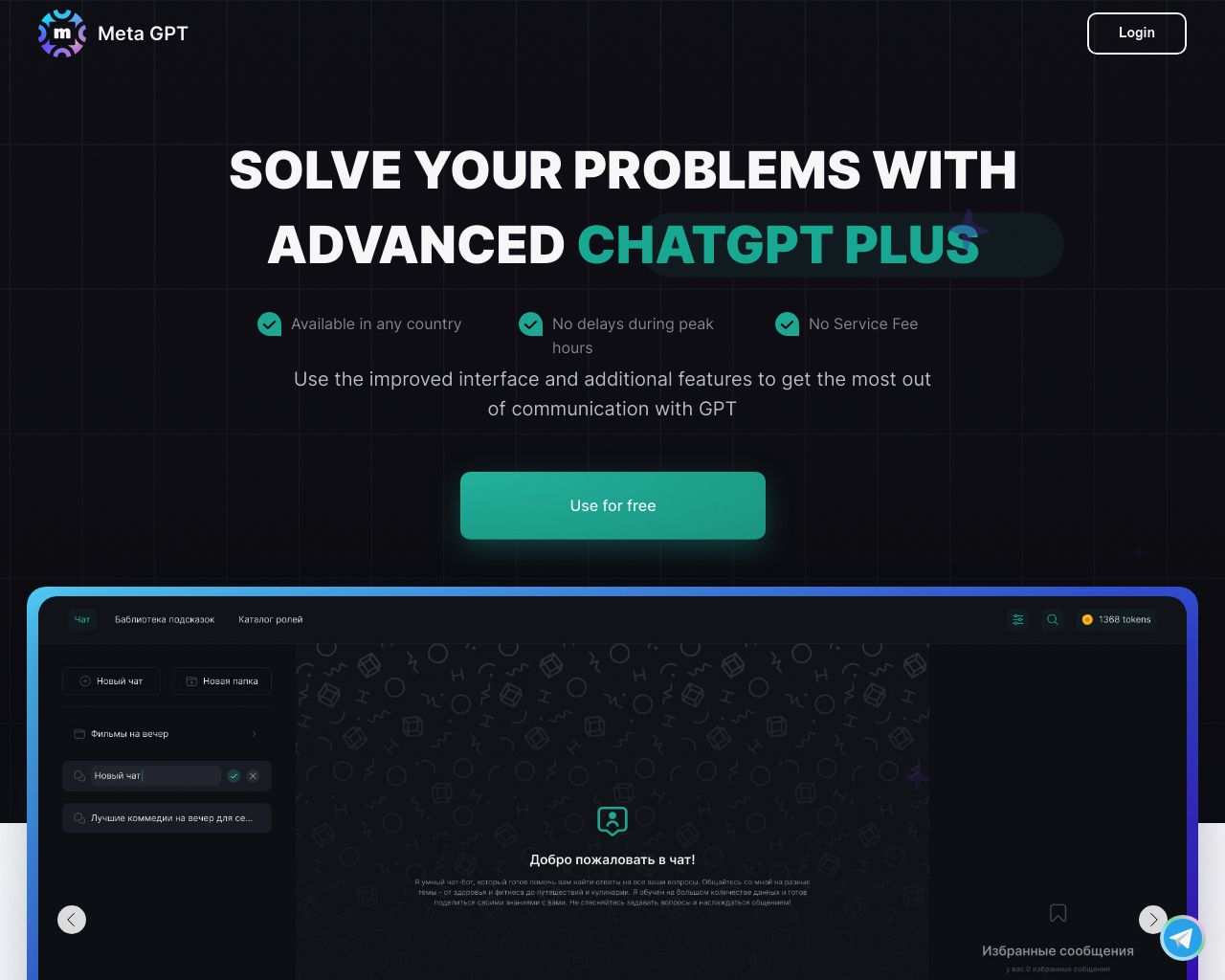Pezzo And OpenAgents: An In-depth Comparison of AI Solutions
AI development platforms have transformed the landscape of software engineering, offering powerful tools to streamline workflows and enhance productivity. Pezzo and MetaGPT represent two distinct approaches to AI development, each with unique strengths and limitations. Pezzo focuses on prompt management and optimization, providing developers with robust tools for version control and A/B testing.
MetaGPT, in contrast, simulates a software company structure, enabling complex task decomposition through specialized AI agents. This comparison explores the core features, security measures, and overall effectiveness of both platforms, highlighting their strengths and potential shortcomings. By examining these tools side-by-side, we aim to provide developers, business leaders, and AI enthusiasts with valuable insights to make informed decisions about their AI development needs.
Pezzo Overview
Pezzo empowers developers to streamline AI development with its open-source toolkit. The platform excels in prompt management, offering effortless version control and collaboration features that accelerate AI solution delivery.


Pezzo’s standout features include A/B testing capabilities for optimizing AI model performance and cost optimization tools that can potentially reduce expenses by up to 50%. The platform provides real-time trading and charting functionalities, enhancing the AI development experience with deeper insights and robust solutions.
Pezzo’s standout features include A/B testing capabilities for optimizing AI model performance and cost optimization tools that can potentially reduce expenses by up to 50%.
Comprehensive troubleshooting tools set Pezzo apart, offering execution history, time-travel debugging, and test suites. These features enable developers to deploy AI models confidently, reducing debugging time and enhancing overall productivity. Pezzo’s focus on transparency provides teams with detailed visibility into AI operations, facilitating efficient problem-solving and collaboration.
While Pezzo offers significant advantages in AI development workflows, it lacks some features found in more comprehensive platforms. The absence of a visual builder or no-code editor may limit accessibility for non-technical users. Additionally, Pezzo does not provide specific functionalities for AI agent creation or management, which might be a consideration for users looking for end-to-end AI agent solutions.
Pezzo integrates seamlessly with existing development environments, supporting multiple stages from development to production. Its API-first approach allows for flexible deployment options, enabling teams to incorporate AI capabilities into their existing systems efficiently. As an open-source solution with an upcoming cloud service, Pezzo offers accessibility and potential for customization that appeals to a wide range of AI enthusiasts and professionals.
MetaGPT Overview
MetaGPT revolutionizes multi-agent collaboration by combining human Standardized Operating Procedures (SOPs) with advanced Large Language Models (LLMs). This open-source framework simulates a software company’s structure, assigning distinct roles like product managers, architects, and engineers to AI agents.


MetaGPT’s core philosophy, “Code = SOP(Team),” encodes human workflows into prompt sequences, enhancing output consistency and reliability. The platform breaks complex tasks into manageable subtasks, leveraging specialized agents to contribute their expertise. This approach significantly reduces errors common in multi-agent systems, such as cascading hallucinations or logic inconsistencies.
MetaGPT’s core philosophy, “Code = SOP(Team),” encodes human workflows into prompt sequences, enhancing output consistency and reliability.
The framework generates comprehensive documentation throughout the development process, including requirement documents, design artifacts, and interface specifications. These intermediate outputs improve the final code’s success rate and facilitate better human-AI interaction.
MetaGPT’s unique selling point lies in its ability to mimic and enhance human collaboration processes within an AI framework. By incorporating SOPs and specialized roles, it ensures efficient and organized teamwork among AI agents. This approach improves multi-agent system performance and opens new possibilities for AI applications in complex, real-world scenarios.
However, MetaGPT’s focus on software development tasks may limit its applicability in non-technical domains. The platform’s reliance on coding knowledge could present a barrier for users without programming expertise. Additionally, as an open-source project, it may lack the robust support and regular updates provided by commercial alternatives.
Feature Comparison
Pezzo and MetaGPT offer distinct approaches to AI development, with notable differences in their core components and security features. Pezzo excels in prompt management and optimization, providing tools for version control, A/B testing, and cost reduction. Its focus on streamlining AI workflows makes it valuable for developers seeking to enhance productivity and efficiency in AI projects. MetaGPT, on the other hand, simulates a software company structure, assigning specialized roles to AI agents for collaborative problem-solving. This approach enables complex task decomposition and comprehensive documentation generation throughout the development process.
In terms of core components, Pezzo lacks a visual builder or no-code editor, potentially limiting accessibility for non-technical users. MetaGPT, while powerful in multi-agent collaboration, may not offer the same level of user-friendly interfaces found in more commercially-oriented platforms. Both systems provide debugging capabilities, but Pezzo’s observability features offer more detailed insights into AI operations. MetaGPT’s strength lies in its ability to generate intermediate outputs like requirement documents and design artifacts, which Pezzo does not explicitly offer.
Regarding security, neither platform prominently features advanced encryption or OAuth support in their documentation. This gap contrasts with more comprehensive commercial solutions that prioritize data protection and access control. While both Pezzo and MetaGPT bring unique strengths to AI development, users requiring robust security measures or seeking a balance between power and ease-of-use may find these open-source options lacking in certain aspects compared to more feature-rich alternatives.
Feature Comparison Table
| Pezzo | MetaGPT | SmythOS | |
|---|---|---|---|
| CORE FEATURES | |||
| Hosted Agents (Dev, Production) | ❌ | ✅ | ✅ |
| Visual Builder | ❌ | ❌ | ✅ |
| No-Code Options | ❌ | ❌ | ✅ |
| Memory & Context | ❌ | ✅ | ✅ |
| Autonomous Agents | ❌ | ✅ | ✅ |
| SECURITY | |||
| Constrained Alignment | ❌ | ✅ | ✅ |
| IP Control | ❌ | ❌ | ✅ |
| COMPONENTS | |||
| Data Lakes | ❌ | ❌ | ✅ |
| DEPLOYMENT OPTIONS (EMBODIMENTS) | |||
| Staging Domains | ✅ | ❌ | ✅ |
| Deploy as Scheduled Agent | ❌ | ✅ | ✅ |
| DATA LAKE SUPPORT | |||
| Hosted Vector Database | ❌ | ❌ | ✅ |
| Sitemap Crawler | ❌ | ❌ | ✅ |
| YouTube Transcript Crawler | ❌ | ❌ | ✅ |
Best Alternative to Pezzo and MetaGPT
SmythOS stands out as the superior alternative to Pezzo and MetaGPT for AI agent development and deployment. Our platform combines powerful capabilities with unmatched ease of use, empowering users to create sophisticated AI solutions without extensive coding knowledge. SmythOS’s visual drag-and-drop interface enables rapid agent creation, while our extensive library of pre-built components and API integrations accelerates development. Unlike Pezzo’s limited focus on prompt management or MetaGPT’s complex multi-agent simulation, SmythOS offers a comprehensive suite of tools for building, deploying, and managing AI agents across diverse use cases.
SmythOS stands out as the superior alternative to Pezzo and MetaGPT for AI agent development and deployment… empowering users to create sophisticated AI solutions without extensive coding knowledge.
We provide advanced features that Pezzo and MetaGPT lack, including a no-code editor, hosted vector databases, and flexible deployment options. Our platform supports multimodal interactions, autonomous agent capabilities, and seamless scaling from development to production. SmythOS also prioritizes security with data encryption, OAuth support, and IP controls — critical enterprise features missing from the open-source alternatives.
SmythOS provides advanced features… including a no-code editor, hosted vector databases, and flexible deployment options… and seamless scaling from development to production.
SmythOS delivers unparalleled versatility, allowing users to create everything from simple chatbots to complex autonomous systems. Our intuitive interface combined with robust functionality makes AI development accessible to both novices and experts alike. Whether you’re automating customer service, enhancing data analysis, or pioneering new AI applications, SmythOS provides the ideal foundation to bring your vision to life quickly and efficiently.
Conclusion
Pezzo and MetaGPT offer unique approaches to AI development, each with distinct strengths. Pezzo excels in prompt management and optimization, providing valuable tools for version control and A/B testing. MetaGPT simulates a software company structure, enabling complex task decomposition through specialized AI agents. However, both platforms have limitations that may not fully meet the needs of all users.
SmythOS emerges as the superior choice, combining the best aspects of both platforms while addressing their shortcomings. Our drag-and-drop interface and no-code editor make AI development accessible to users of all skill levels. We offer robust security features, including data encryption and OAuth support, ensuring your AI operations remain protected. Our platform supports multimodal interactions, problem-solving capabilities, and seamless multi-agent collaboration, surpassing the offerings of both Pezzo and MetaGPT.
For those seeking a comprehensive, user-friendly, and powerful AI development platform, SmythOS stands out as the clear winner. We invite you to explore our diverse range of AI-powered agent templates and experience unlimited AI automation risk-free. With SmythOS, you’ll unlock the full potential of AI for your business, streamlining operations and driving innovation like never before.
Last updated:
Disclaimer: The information presented in this article is for general informational purposes only and is provided as is. While we strive to keep the content up-to-date and accurate, we make no representations or warranties of any kind, express or implied, about the completeness, accuracy, reliability, suitability, or availability of the information contained in this article.
Any reliance you place on such information is strictly at your own risk. We reserve the right to make additions, deletions, or modifications to the contents of this article at any time without prior notice.
In no event will we be liable for any loss or damage including without limitation, indirect or consequential loss or damage, or any loss or damage whatsoever arising from loss of data, profits, or any other loss not specified herein arising out of, or in connection with, the use of this article.
Despite our best efforts, this article may contain oversights, errors, or omissions. If you notice any inaccuracies or have concerns about the content, please report them through our content feedback form. Your input helps us maintain the quality and reliability of our information.
